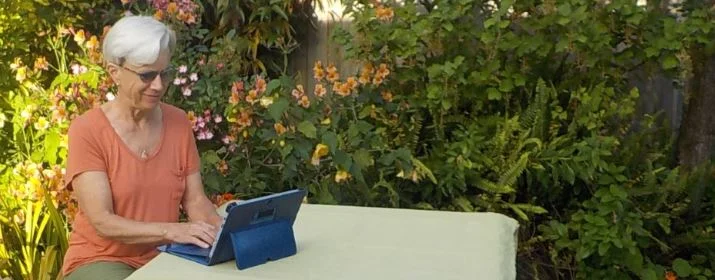Late Blooming Part 1
/Late Blooming: Part 1--5/23/2019
Maximizing Mind/Body Coordination for your Later Years
Using Alexander Technique and Mental Redirection
For many of us, our 30’s and 40’s are busy times, when we are fully engaged in careers, and possibly raising children. We bring our experiences and assumptions from early life to these endeavors, without having a lot of time to question these patterns.
As our children start to leave home, it can feel as though our best years are over. Maybe we feel exhausted and less attractive than earlier. Sometimes we have mid-life or health crisis. On the surface, these can look like problems, but they can force us to start to look at the world from other perspectives.
When I was 50 years old, I started to have debilitating, chronic neck pain. Medical doctors told me that I needed to have the vertebrae in my neck fused, or I would lose the use of my right arm. Some acquaintances of mine had studied Alexander Technique and I decided to give this a try, eventually studying to become a teacher. Alexander Technique introduced me to forces of alignment within the body, that support what I call Effortless Uprightness, which I will cover in chapters on Posture.
Alexander Technique lessons also initiated the first noticeable change in my brain function. It taught me that a simple pause before acting, creates choice and improves outcomes . The brain relegates as many functions as possible to the Basal Ganglia. While this makes backing the car out of the driveway easier than it was the first time you did it, it also results automatic habits and responses that may not be serving us well.
It is common that Alexander Technique teachers talk about how we “use ourselves”, often in regards to postural habits, resulting from mental stimuli. But some years into my Alexander Technique training, I met a teacher who addressed my mental habits directly. He suggested that I was trying to keep myself safe thinking of everything that could possibly go wrong. (I remembered coming up with this idea when I was about 10 years old.) Additionally, he suggested that constantly thinking of worst-case outcomes has a negative impact on your nervous systems. He wanted me to try to Trust Creation or The Flow of Life.
This was hard, but I chose one thing that I was particularly anxious about. Every time I noticed that I was stressing about this one thing, I would tell myself to “Trust”. What happened next surprised me: With lower levels of anxiety, I started to experience more intuition, which made me feel increasingly connected with the flow of positive life force. This was such a positive experience that it gave me the confidence to apply this Trust practice to other areas of anxiety.
It also piqued my interest in the brain, both by observation and by reading about brain science, and I started to come up with practices that I have found to be especially helpful.
After a couple of years, I have begun to use my brain quite differently than previously. Although I am in my late sixties, I experience increasing clarity of mind, and less confusion, overwhelm, and agitation than when I was younger. It feels like a Late Blooming.


